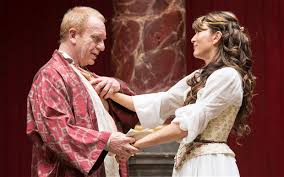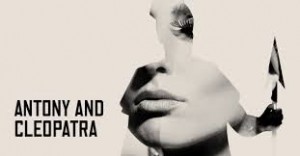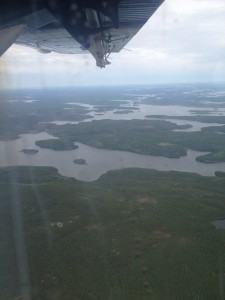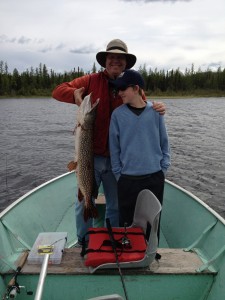 The most joyous moment in this summer’s production of Antony and Cleopatra at the Globe in London involved fishing. One reason I’ve not posted a review of the show since I saw it on June 13 with my awesome onetime student Jaquon Heath is that after I got home I left immediately for a fishing trip in the waterworld of northern Saskatchewan, as part of my first multi-country trip of the summer.
The most joyous moment in this summer’s production of Antony and Cleopatra at the Globe in London involved fishing. One reason I’ve not posted a review of the show since I saw it on June 13 with my awesome onetime student Jaquon Heath is that after I got home I left immediately for a fishing trip in the waterworld of northern Saskatchewan, as part of my first multi-country trip of the summer.
Eve Best, who played a winning and funny Cleopatra, though perhaps just a touch shy of transcendence, reached down fairly early in the play to a young boy in the front of the standing area. Cupping his face, she rhapsodized about fishing with Antony:
Give me mine angle; we’ll to the river: there,
My music playing far off, I will betray
Tawny-finn’d fishes; my bended hook shall pierce
Their slimy jaws; and, as I draw them up,
I’ll think them every one an Antony,
And say ‘Ah, ha! you’re caught (2.5).
Embracing the boy’s neck and kissing his forehead, she threatened to draw him up onstage to replace then-missing Antony. It was a classic Globe move, leveraging the intimacy of the replica theater and the feeling it creates of sharing a hidden space, between Thames outside and planes overhead, of theatrical privacy. For an instant, we were all right there with Cleopatra.
There were some other fine moments in the production: a great drinking-and-dancing party on Pompey’s boat, an aggressive performance by Phillip Corella as Pompey, in what’s becoming my favorite part in this play, and some fast-paced battle scenes. Enobarbus as played by Phil Daniels was sharp but rather more sour than I like for the only Roman who dies of heartbreak.
This play thrives on its two stars, and I was only halfway won over. Eve Best was great fun, but the decision to enthrone her in death at the end spoke, it seemed to me, to a need to add regal stature to her performance. Clive Wood’s Antony was engaging and broad-shouldered, but not really convincing as a political player. I’d love to see him play Falstaff — but actually I have the feeling I already have seen much of that role in his Antony. It makes me wonder about an alternative version of the fat knight who’s not as physically ludicrous as he is usually played: what if Sir John has gone to seed, but you can still see the steel underneath? I’d be interested to see Wood play that part.
Fishing isn’t a bad metaphor for live theater: the project is, as Cleopatra says, to catch us and draw us up. I’ve never had a bad night at the Globe, though I’ve seen better productions there.
The key element of the play that this production didn’t quite capture, not even in Jolyon Coy’s razor-focused Caesar, was power politics. To become “sole sir o’ the world” (5.2) requires massive concentration, resourcefulness, and obsessive focus. Antony gives it all away, but I like a production that shows him able to grasp it first. Cleopatra’s parting shot, “Tis paltry to be Caesar” (5.2), works best if it’s clear that she understands power.
I kept thinking about power on my next trip, because in the Churchill River system in northern Saskatchewan I fished for the creature that teaches Wart about power in The Sword in the Stone. The pike teaches a simple lesson:
the Power of the body decides everything in the end, and only Might is Right.
T. H. White, about whom I’ve just read a fascinating mini-bio in Phillip Hoare’s The Sea Inside, doesn’t mean the pike’s lesson to be the final word in the eduction of young King Arthur, but there’s a lesson there nonetheless.
I thought about that while fishing for northern pike in the Churchill River.
We caught a few big ones, and released them back into the water. Some of the smaller ones we ate for lunch.


Leave a Reply